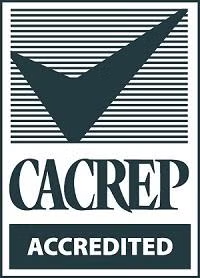CACREP Accreditation

PAU is a Fully-Accredited Program
Accredited MA in Clinical Mental Health Counseling
Accreditation by the Council for Accreditation of Counseling and Related Educational Programs (CACREP) is the recognized gold standard for mental health counseling training.
Palo Alto University’s accredited programs and faculty training meet or exceed CACREP standards, reflecting our commitment to providing the highest quality of training for all students.
Online and hybrid formats are available.
Why is CACREP Accreditation Important?
- Universities that are accredited reflect meeting and/or exceeding those standards of quality within their program as set forth by the council.
- Accreditation also reflects the institution's commitment to providing the highest level of care for its student.
- CACREP provides guidance to institutions in determining acceptability of transfer credits into a CACREP program.
- Graduates from a CACREP program have the tools to perform better on their Licensure exam and certification.
- CACREP programs are easily portable across other states to meet the education requirements for licensure.
- Various government agencies, such as the Veterans Health Administration, primarily hire CACREP graduates.
What is CACREP?
In the field of mental health counseling programs, the accreditation most often associated is CACREP: Council for Accreditation of Counseling and Related Educational Program. In order for any organization to get CACREP accreditation, they must adhere to the standards set forth by the council.
Palo Alto University CACREP Accredited Counseling Program
The MA in Clinical Mental Health Counseling program is designed to provide the tools for individuals to become qualified and trained clinicians.
Palo Alto University was accredited in January 2017 and received the maximum of eight (8) years CACREP accreditation.
Mission of the MA in Clinical Mental Health Counseling Degree Program
The MA in Clinical Mental Health Counseling program is a diverse and dynamic community dedicated to the development of highly effective mental health counselors, future leaders and innovators in the counseling profession. In and through its training of burgeoning counselors, the program strives to benefit society and reduce human suffering by promoting mental health, wellness, social justice, education, and vocational well-being.
The program is committed to five core values: creating and nurturing a diverse and inclusive learning community for all students, faculty, and staff; providing excellent education and clinical supervision for students; promoting healing and empowerment by addressing social privilege and oppression; generating knowledge through research and scholarship of the highest level; and providing services to the local, national and international community informed by science and scholarship.
Program and Student Learning Outcomes of the MA in Clinical Mental Health Counseling Degree Program
- Outcome 1- Professional Counseling Orientation and Ethical Practice: Graduates will have internalized and integrated roles, responsibilities, and relationships of a professional counselor in alignment with ethical and legal standards of practice with a focus on serving as an advocate on behalf of clients to address systemic, institutional, architectural, attitudinal, disability, and social barriers that impede access, equity, and success. (CACREP Standards 3.1.c., 3.1.j., 3.1.d., WASC CC 1, ILO 7)
- Outcome 2 - Social and Cultural Diversity: Graduates will have developed an understanding of the effects of various socio historical and cultural factors on mental and physical health and wellbeing as well as strategies for identifying and eliminating barriers created by discrimination, oppression, implicit bias, and prejudices. (CACREP Standards 3.2.f., 3.2.i., WASC CC 1, 2, ILO 4)
- Outcome 3 - Lifespan Development: Graduates will have integrated an understanding of the theories of individual and family development across the lifespan including systemic, social justice, cultural, and environmental factors that affect lifespan development, functioning, behavior, resilience, and overall wellness. (CACREP Standards 3.3.a., 3.3.k., WASC CC 1, ILO 1, 5)
- Outcome 4 - Career Development: Graduates will have demonstrated the ability to apply theories and models of career development, counseling, and decision making to employ strategies for improving access to educational and occupational opportunities for people from marginalized groups. (CACREP Standards 3.4.a., 3.4.k., WASC CC 1, 4, ILO 1)
- Outcome 5 - Counseling Practice and Relationships: Graduates will have applied theories and models of counseling through essential interviewing, counseling, and case conceptualization skills and will have integrated a critical thinking approach to conceptualizing client development, presenting issues, and culturally relevant counseling strategies and approaches. (CACREP Standards 3.5.a., 3.5.b., 3.5.c., 3.5.g., WASC CC 1, ILO 2, 4, 5)
- Outcome 6 - Group Counseling and Effective Leadership: Graduates will have incorporated theoretical foundations of group work to become a group process facilitator and a positive force in achieving high levels of participation, cooperation and cohesion in group work across diverse counseling settings and with diverse client populations. (CACREP Standards 3.6.a, 3.6.b., 3.6.f., 3.6.h., WASC CC 1, ILO 2, 4, 5)
- Outcome 7 - Assessment and Diagnosis: Graduates will have acquired, refined, and demonstrated appropriate ability to assess diverse client issues for diagnosis and treatment planning using culturally informed approaches and assessments. (CACREP Standards 3.7.e., 3.7.k., WASC CC 1, 2, ILO 1, 2)
- Outcome 8 - Research and Program Evaluation: Graduates will have demonstrated the ability to critique research and evaluate client (and/or program) outcomes in order to incorporate evidence-based, culturally responsive, counseling practices in a variety of settings. (CACREP Standards 3.8.a., 3.8.b., 3.8.i., WASC CC 1, 3, ILO 1, 3)
- Outcome 9 CMHC Specialty - Professional Practice: Graduates will have acquired, refined, and demonstrated appropriate knowledge, skills, and dispositions to effectively assess, diagnose, and treat clients in a variety of settings as well as advocate for equitable care for the communities they serve. (CACREP Standards 5.a., 5.c., 5.d., 5.e., WASC CC 1, 2, 4, ILO 1, 2, 6, 8)
- Outcome 10 (MFCC Emphasis Only*) - Professional Practice: Graduates will have acquired, refined, and demonstrated appropriate knowledge, skills, and dispositions to effectively work with couples, families, and other systems in a variety of settings. (CACREP Standards 5.g., 5.h., 5.j., WASC CC 1, 2, 4, ILO 1, 2, 6, 8) *This outcome is required only for students who select the MFCC emphasis.
Counseling Annual Data Report
2024-2025 Annual Data Report
The Department of Counseling (MFCC and CMHC tracks) has developed and implemented a comprehensive assessment plan that guides both student-level and program-level assessment. As required by the Council for Accreditation of Counseling and Related Educational Programs (CACREP), the counseling faculty participate in an annual review of curriculum, processes, student learning, and student and program outcomes through a systematic process of evaluation and assessment.
In January 2026, the Palo Alto University Counseling faculty and staff reviewed the research findings on students, graduates, and clinical supervisors and employers of our students and graduates. The Counseling Department Advisory Committee reviewed the data and observations of the faculty and staff in February 2026. The period of examination is from September 2024 through June 2025.
As required by CACREP, the Department of Counseling publishes an annual data report on its website and shares the posting of this data with students, faculty, site supervisors, alumni, and university leadership. The 2024-2025 report is posted here.
In addition, the Department of Counseling collects and posts each year outcome data as required by CACREP to include student graduation rates, completion rates, employment data, and licensure pass rates on credentialing exams. This data for 2024-2025 is found in the CMHC Outcomes Report.
269
Number of graduates
in the past year.
93.2%
Degree Completion Rate
81%
LPCC Law & Ethics Exam
Licensure & Exam Pass Rate
78%
NCMHCE
Licensure & Exam Pass Rate
77%
LMFT Law & Ethics Exam
Pass Rate
86%
LMFT
Licensure & Exam Pass Rate
75.22%
Combined employment and doctoral admissions rates of students/graduates.

Counseling Department @ PAU
Palo Alto University has faculty that are CACREP-trained, which reflects the institute's commitment to providing education of the highest quality.

